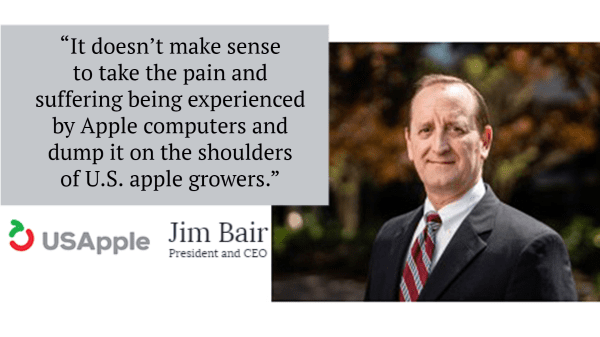At the end of October, the U.S and European Union agreed to end a dispute over steel and aluminum tariffs that caused retaliation against agricultural products including apples.
Jim Bair, President and CEO of the U.S. Apple Association BB #:145473 said in a Nov. 8 interview that retaliatory tariffs against apples have been harmful to apple growers, and he’s working to ease this burden.
He said U.S. apple exports totaled 40.8 million bushels for the 2020-21 crop year, down from more than 53 million bushels as recently as 2018-19.
“The most recent data are September 2021, and they show a 6 percent decline for the month compared with last year,” Bair said. “It’s difficult to predict exports this year as the loss of India and China aren’t likely to be made up elsewhere.”
In normal years, he said U.S. apple growers export about one-third of the crop.
“Obviously, that’s important in absolute terms, but also in the variety mix that predominate in preference by our trade partners,” Bair said.
“Red Delicious and Golden Delicious are at the top of that list but falling fast in preference with U.S. consumers. So, exports have been key to moving those varieties to markets where they won’t overhang the domestic market and depress prices.”
When the U.S. imposed the Section 232 steel and aluminum tariffs on India, it was the No.2 export market and growing, Bair said. India responded with retaliatory tariffs on apples, and the total tariffs are now 70 percent, which has seen India’s imports of U.S. apples plummet 75 percent in two years.
While China is a relatively new market, having just been opened in 2015, Bair said in just three years it had grown to be the No.6 export market.
Total tariffs into China for U.S. apples are now 55 percent, he said, and exports there have declined 50 percent in 3 years.
“I’ve said, it doesn’t make sense to take the pain and suffering being experienced by Apple computers and dump it on the shoulders of U.S. apple growers,” Bair said.
“Obviously the tariffs on exports of U.S. apples to India and China are painful, and we are advocating as hard as we can that those tariffs need to be removed,” he said.
“With respect to the EU, its members buy very few U.S. apples with the small exception of some organic apples. The EU’s unscientific rules follow the so-called Precautionary Principle which takes a ridiculously conservative approach against even infinitesimally low residues of modern production compounds. That approach never made scientific sense, and even less so with every day.”
Bair said he and apple industry leaders are working with the Biden administration to help ease these tariffs.
“The prospects aren’t very good but hope springs eternal and we have insider reports that Agriculture Secretary Tom Vilsack has been aggressive in advocating for U.S. grower’s interests,” Bair said.



